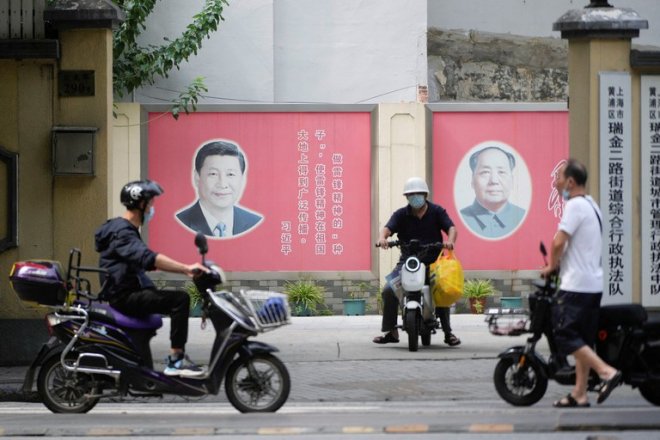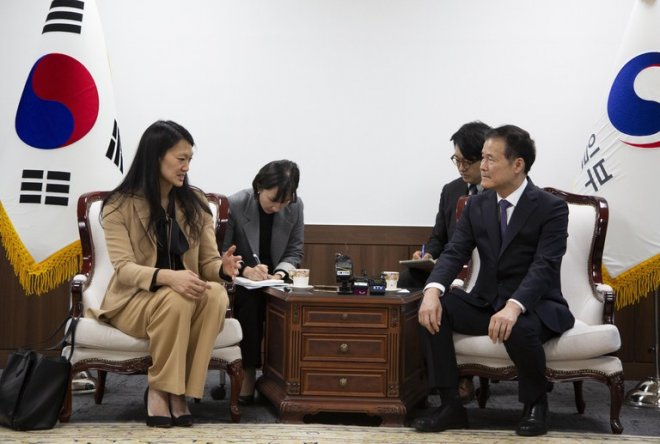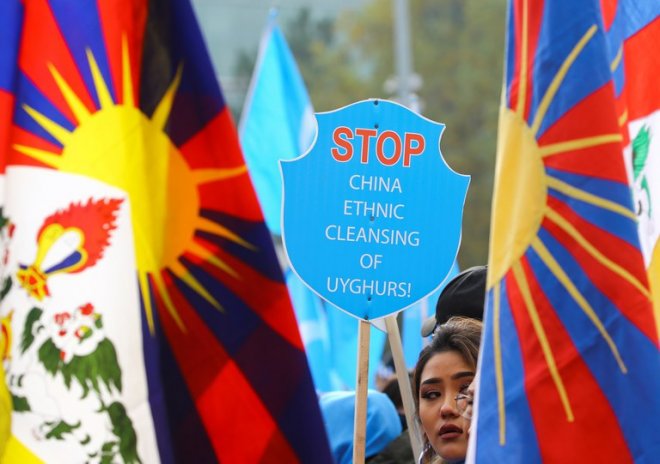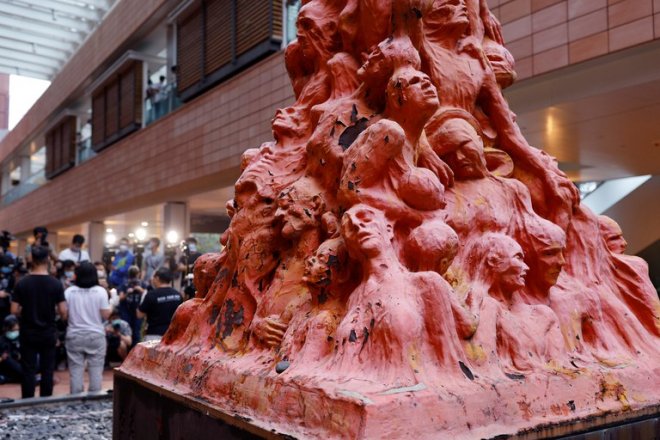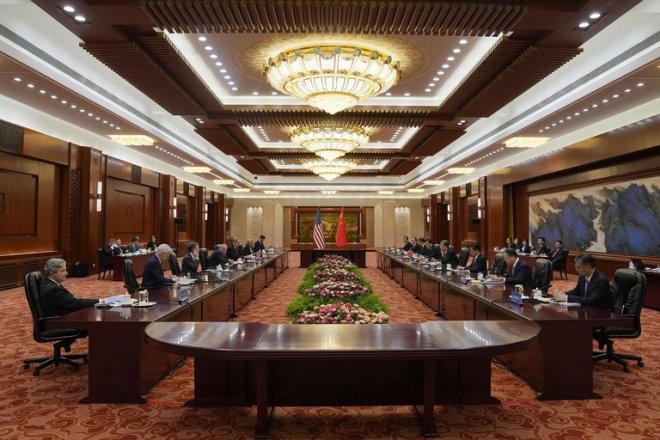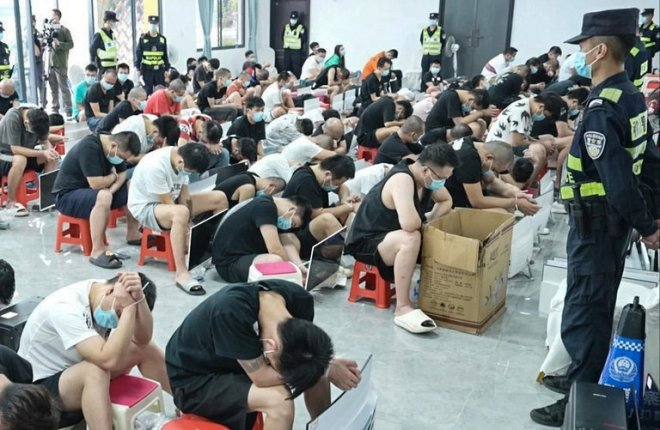Rights lawyer, activist wife forced from Beijing home following utilities shutoff
A human rights lawyer and his family were forced to move out of their home after their landlord shut down their water and electricity – a tactic used recently on other activists as authorities seek to drive dissidents and rights lawyers out of Beijing.
Wang Quanzhang and his wife, rights activist Li Wenzu, have lived in a community in Beijing’s Shunyi district for almost three years. Recently, their landlord asked them to move out, and on Wednesday, the utilities were shut off.
“Look at our house. It’s pitch dark,” Li said in a video posted online. “Quanzhang lit up a candle. It’s dim, but It still sheds some light in the house.”
“Never would I have imagined that we would need to live with candlelight in Beijing,” she said.
Wang was a prominent target of a nationwide crackdown that saw more than 300 human rights lawyers and associates detained beginning on the night of July 9, 2015 – known as the “709 Crackdown.” He was subsequently jailed for several years after he was found guilty of “subversion of state power,” and later sued the authorities over his treatment while in detention.
![]() Security officers surround Li Wenzu, center, the wife of detained Chinese human rights lawyer Wang Quanzhang, as she attempts to deliver a petition to the Supreme People’s Court petition office in Beijing, Dec. 28, 2018. Credit: Mark Schiefelbein/AP
Security officers surround Li Wenzu, center, the wife of detained Chinese human rights lawyer Wang Quanzhang, as she attempts to deliver a petition to the Supreme People’s Court petition office in Beijing, Dec. 28, 2018. Credit: Mark Schiefelbein/AP
Lately, his family has dealt with unreasonable demands from the landlord, including multiple rent increases and home renovations, Wang said.
They’ve also faced “stability maintenance” measures from authorities in Beijing and Wang’s home province of Shandong – steps aimed at forestalling any form of public protest or criticism of the government during key political events or politically sensitive dates in the calendar.
Last year, the Beijing Municipal People’s Congress passed a rental ordinance that forbids landlords from forcing tenants out of leasing agreements by shutting off utilities. But the landlord’s actions, and his insistence that the family leave, ignore that ordinance, Wang said.
“I feel that behind the landlord’s insistence, there must be some sort of approval or encouragement that motivated him to do so,” he said.
Wang said Beijing authorities have been pushing him to move back to Shandong, but haven’t had a clear-cut legal basis to force the move. This week, he called the police over the utility shut-off.
“The police seemed to have come prepared,” he said. “They asked a few simple questions and left, after telling me that this is not a criminal case but a civil dispute.”
In March, state security police surrounded their home on International Women’s Day. They did the same in December on Human Rights Day, Wang said.
‘Beijing has become intense’
Li Heping, another lawyer persecuted in the “709 Crackdown,” is also facing eviction from his Beijing home. He and his family have encountered many obstacles in finding another place to live.
“We had tried to rent in various locations. However, in just three or four hours after signing a leasing contract, the police would visit our landlord,” said Li’s wife, Wang Yuling.
The landlord would then refuse to rent the property and would change the locks, she said. Additionally, the family has been followed by plain-clothes police and has faced other surveillance measures.
“Recently, for reasons unknown, the situation in Beijing has become intense,” she said.
![]() A protester holds a picture of Chinese human rights lawyer Wang Quanzhang during a protest outside the Chinese liaison office in Hong Kong, July 13, 2018. Credit: Vincent Yu/AP
A protester holds a picture of Chinese human rights lawyer Wang Quanzhang during a protest outside the Chinese liaison office in Hong Kong, July 13, 2018. Credit: Vincent Yu/AP
Independent journalist Gao Yu told Radio Free Asia that authorities are evicting non-Beijing registered human rights activists with the same tactics used in the past to expel so-called “low-end” unregistered migrant workers.
Ji Feng, a student leader in the 1989 Tiananmen protests who has lived in Beijing’s Songzhuang artist’s village for eight years, has faced similar treatment.
The local party secretary visited Ji’s new landlord, who then terminated his lease, and State Security officials have told Ji they would help him relocate to Hebei, Gao said.
“This is coordinated,” Gao said. “The political persecution is continuing. Persecutions after persecutions.”
Translated by Min Eu. Edited by Matt Reed and Malcolm Foster.
[圖擷取自網路,如有疑問請私訊]
Wang Quanzhang and his wife, rights activist Li Wenzu, have lived in a community in Beijing’s Shunyi district for almost three years. Recently, their landlord asked them to move out, and on Wednesday, the utilities were shut off.
“Look at our house. It’s pitch dark,” Li said in a video posted online. “Quanzhang lit up a candle. It’s dim, but It still sheds some light in the house.”
“Never would I have imagined that we would need to live with candlelight in Beijing,” she said.
Wang was a prominent target of a nationwide crackdown that saw more than 300 human rights lawyers and associates detained beginning on the night of July 9, 2015 – known as the “709 Crackdown.” He was subsequently jailed for several years after he was found guilty of “subversion of state power,” and later sued the authorities over his treatment while in detention.
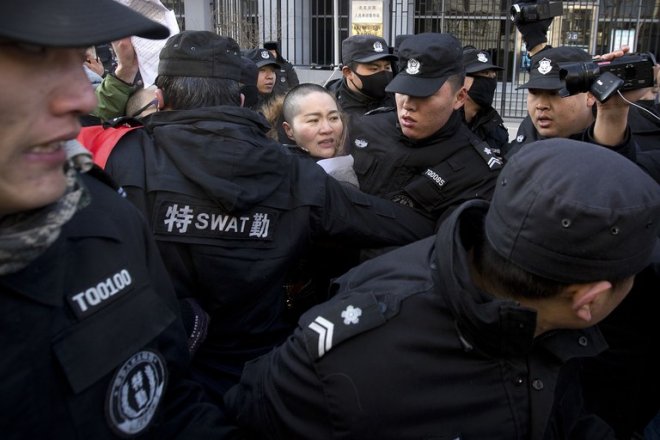 Security officers surround Li Wenzu, center, the wife of detained Chinese human rights lawyer Wang Quanzhang, as she attempts to deliver a petition to the Supreme People’s Court petition office in Beijing, Dec. 28, 2018. Credit: Mark Schiefelbein/AP
Security officers surround Li Wenzu, center, the wife of detained Chinese human rights lawyer Wang Quanzhang, as she attempts to deliver a petition to the Supreme People’s Court petition office in Beijing, Dec. 28, 2018. Credit: Mark Schiefelbein/APLately, his family has dealt with unreasonable demands from the landlord, including multiple rent increases and home renovations, Wang said.
They’ve also faced “stability maintenance” measures from authorities in Beijing and Wang’s home province of Shandong – steps aimed at forestalling any form of public protest or criticism of the government during key political events or politically sensitive dates in the calendar.
Last year, the Beijing Municipal People’s Congress passed a rental ordinance that forbids landlords from forcing tenants out of leasing agreements by shutting off utilities. But the landlord’s actions, and his insistence that the family leave, ignore that ordinance, Wang said.
“I feel that behind the landlord’s insistence, there must be some sort of approval or encouragement that motivated him to do so,” he said.
Wang said Beijing authorities have been pushing him to move back to Shandong, but haven’t had a clear-cut legal basis to force the move. This week, he called the police over the utility shut-off.
“The police seemed to have come prepared,” he said. “They asked a few simple questions and left, after telling me that this is not a criminal case but a civil dispute.”
In March, state security police surrounded their home on International Women’s Day. They did the same in December on Human Rights Day, Wang said.
‘Beijing has become intense’
Li Heping, another lawyer persecuted in the “709 Crackdown,” is also facing eviction from his Beijing home. He and his family have encountered many obstacles in finding another place to live.
“We had tried to rent in various locations. However, in just three or four hours after signing a leasing contract, the police would visit our landlord,” said Li’s wife, Wang Yuling.
The landlord would then refuse to rent the property and would change the locks, she said. Additionally, the family has been followed by plain-clothes police and has faced other surveillance measures.
“Recently, for reasons unknown, the situation in Beijing has become intense,” she said.
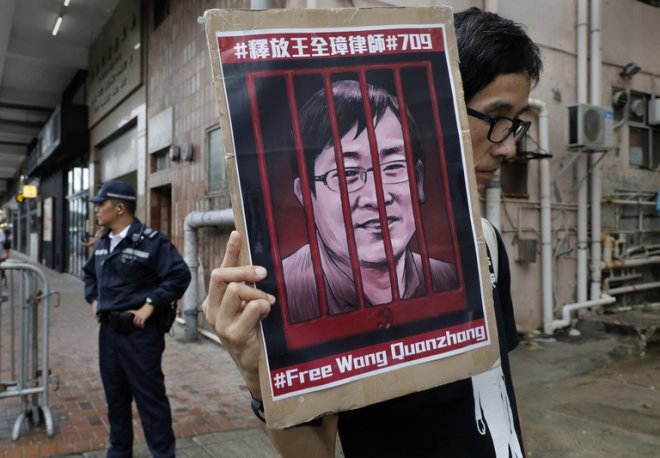 A protester holds a picture of Chinese human rights lawyer Wang Quanzhang during a protest outside the Chinese liaison office in Hong Kong, July 13, 2018. Credit: Vincent Yu/AP
A protester holds a picture of Chinese human rights lawyer Wang Quanzhang during a protest outside the Chinese liaison office in Hong Kong, July 13, 2018. Credit: Vincent Yu/APIndependent journalist Gao Yu told Radio Free Asia that authorities are evicting non-Beijing registered human rights activists with the same tactics used in the past to expel so-called “low-end” unregistered migrant workers.
Ji Feng, a student leader in the 1989 Tiananmen protests who has lived in Beijing’s Songzhuang artist’s village for eight years, has faced similar treatment.
The local party secretary visited Ji’s new landlord, who then terminated his lease, and State Security officials have told Ji they would help him relocate to Hebei, Gao said.
“This is coordinated,” Gao said. “The political persecution is continuing. Persecutions after persecutions.”
Translated by Min Eu. Edited by Matt Reed and Malcolm Foster.
[圖擷取自網路,如有疑問請私訊]
|
本篇 |
不想錯過? 請追蹤FB專頁! |
| 喜歡這篇嗎?快分享吧! |
相關文章
AsianNewsCast








